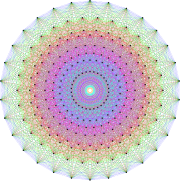| Lie groups and Lie algebras | ||||
|---|---|---|---|---|
 | ||||
Classical groups
|
||||
Simple Lie groups
|
||||
| Other Lie groups | ||||
| Lie algebras | ||||
| Semisimple Lie algebra | ||||
| Representation theory | ||||
| Lie groups in physics | ||||
| Scientists | ||||
In algebra, let g be a Lie algebra over a field K. Let further be a one-form on g. The stabilizer gξ of ξ is the Lie subalgebra of elements of g that annihilate ξ in the coadjoint representation. The index of the Lie algebra is
Examples
Reductive Lie algebras
If g is reductive then the index of g is also the rank of g, because the adjoint and coadjoint representation are isomorphic and rk g is the minimal dimension of a stabilizer of an element in g. This is actually the dimension of the stabilizer of any regular element in g.
Frobenius Lie algebra
If ind g = 0, then g is called Frobenius Lie algebra. This is equivalent to the fact that the Kirillov form is non-singular for some ξ in g. Another equivalent condition when g is the Lie algebra of an algebraic group G, is that g is Frobenius if and only if G has an open orbit in g under the coadjoint representation.
Lie algebra of an algebraic group
If g is the Lie algebra of an algebraic group G, then the index of g is the transcendence degree of the field of rational functions on g that are invariant under the (co)adjoint action of G.
References
- Panyushev, Dmitri I. (2003). "The index of a Lie algebra, the centralizer of a nilpotent element, and the normalizer of the centralizer". Mathematical Proceedings of the Cambridge Philosophical Society. 134 (1): 41–59. doi:10.1017/S0305004102006230. S2CID 13138268.
This article incorporates material from index of a Lie algebra on PlanetMath, which is licensed under the Creative Commons Attribution/Share-Alike License.
Category: be a
be a 
 is non-singular for some ξ in g. Another equivalent condition when g is the Lie algebra of an
is non-singular for some ξ in g. Another equivalent condition when g is the Lie algebra of an